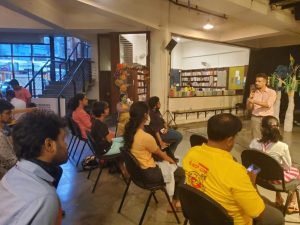
On 2nd July 2022, the Centre for Law and Policy Research (CLPR) took part in RS Connect, a public outreach programme conducted at Ranga Shankara, Bengaluru. In a public talk titled ‘How do we Engage with Our Constitution?’ CLPR resource persons discussed the importance of public engagement with India’s constitutional past and present, to build a vibrant constitutional culture in India. The talk was the first in a series of conversations conducted by CLPR and hosted by Ranga Shankara.
CLPR Senior Research Associate Vineeth Krishna began the talk by pointing out that recent political and social movements—like the CAA protests—have rallied around the Constitution. This, however, should not be seen as evidence for widespread awareness and appreciation of India’s constitutional values among Indians. Studies like the Yuva Nagarik Meter and Politics and Society Between Elections indicate that there is a long way to go.
He then moved on to explaining why Constitutions matter and how they regulate the social, economic and political life of institutions, groups and individual citizens. He traced the history of constitution-making in India by alerting the audience to the Historical Constitutions and sketching out the work of the Constituent Assemby.
Vineeth then focused on a specific constitutional provision—Article 17, which abolishes untouchability. He traced the arguments in the Constituent Assembly between those who wanted to limit the scope of untouchability to caste-based untouchability and those who wanted to keep its scope wide. He juxtaposed this with similar arguments made by lawyers in the Sabarimala Temple Entry Case and the final judgement.
He emphasized that reading the Constitution in this manner, by paying close attention to its text, the debates around it in the Constituent Assembly, and its contemporary interpretation by lawyers and judges in cases, is a key component of building a constitutional culture in India.
The session ended with an engaging question-answer session with the public.
